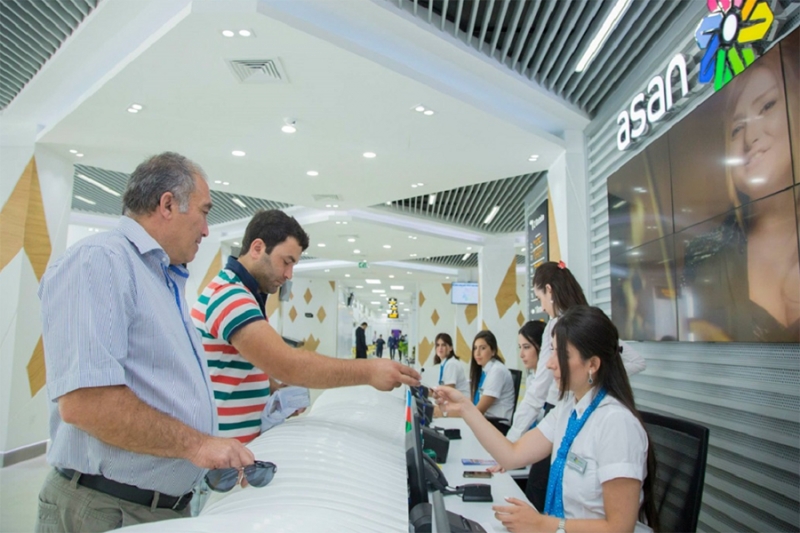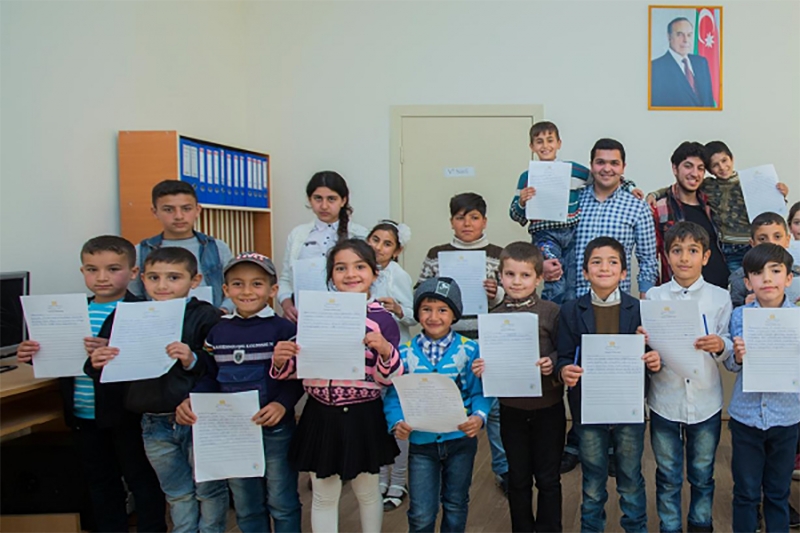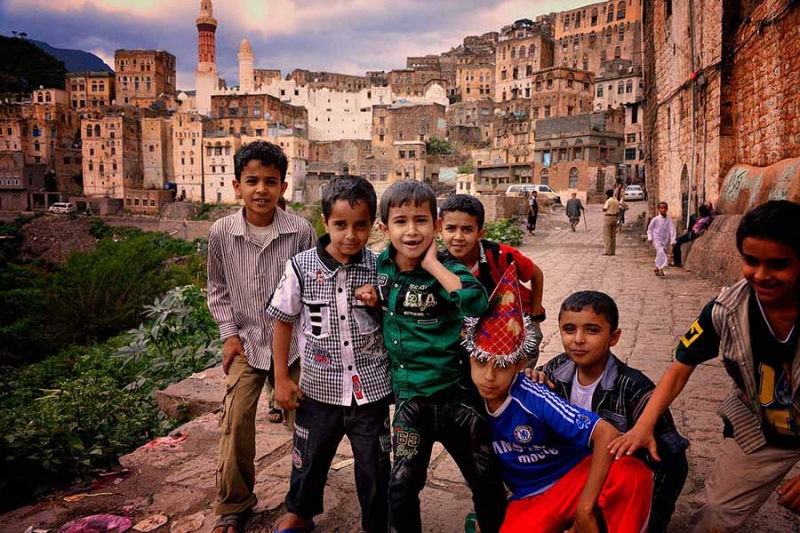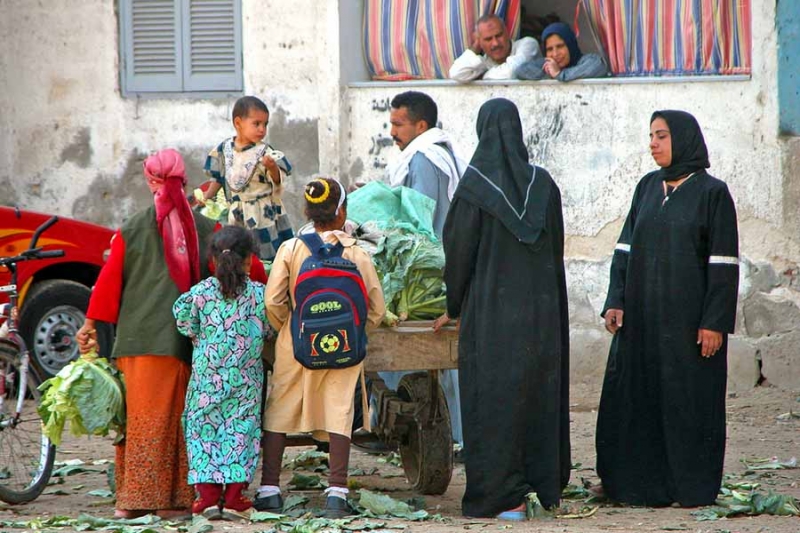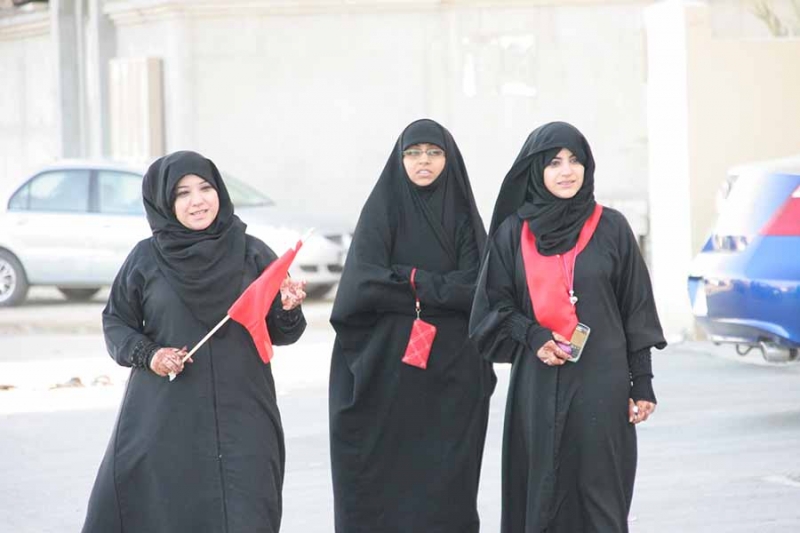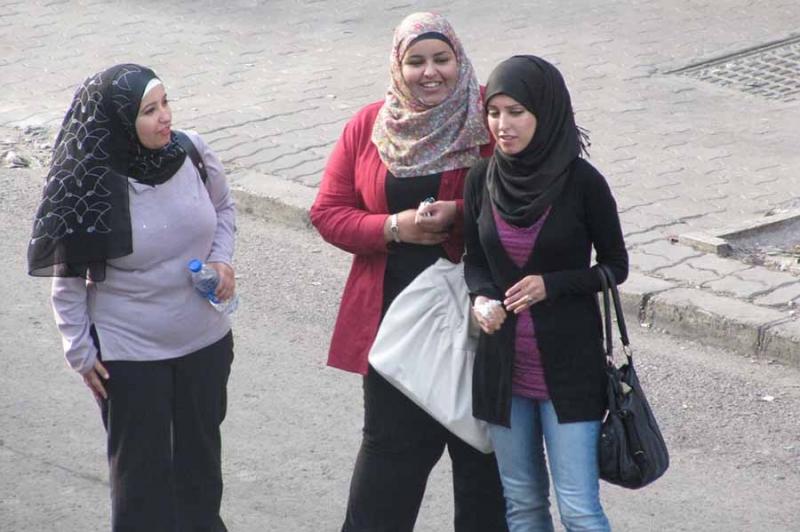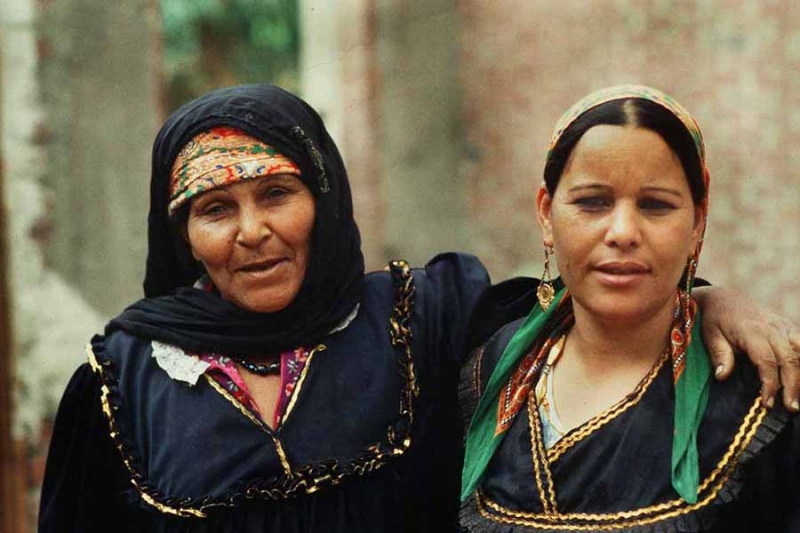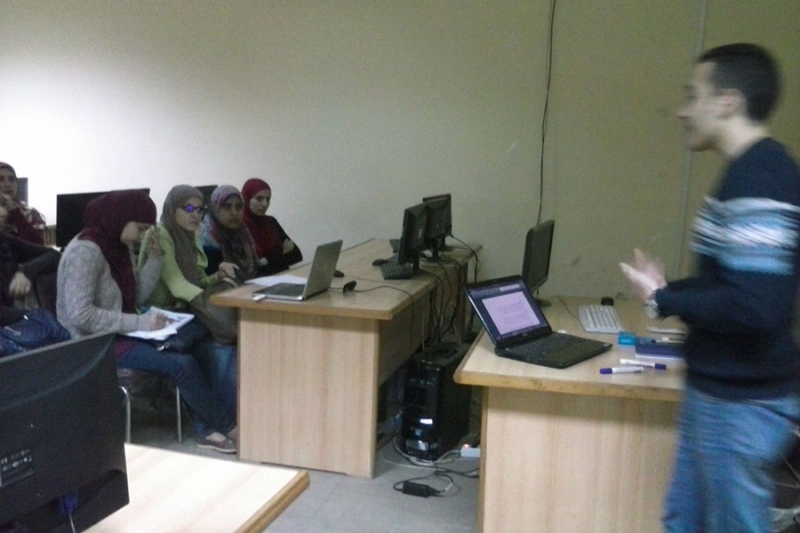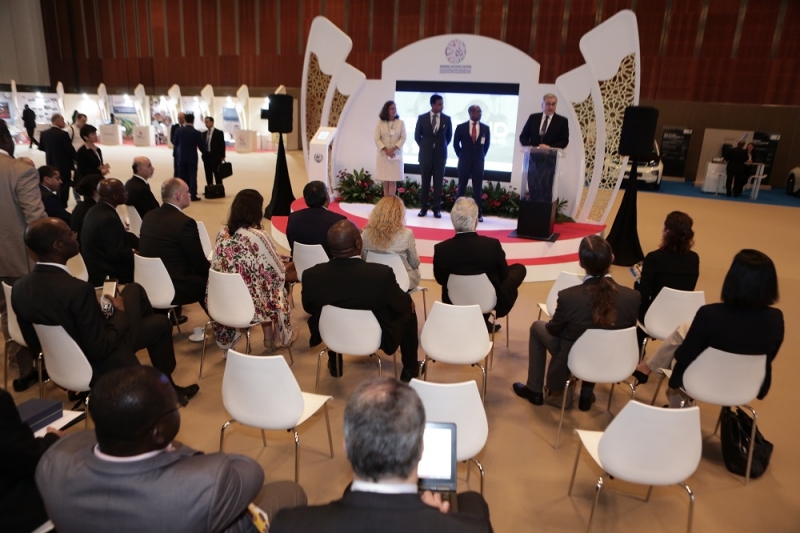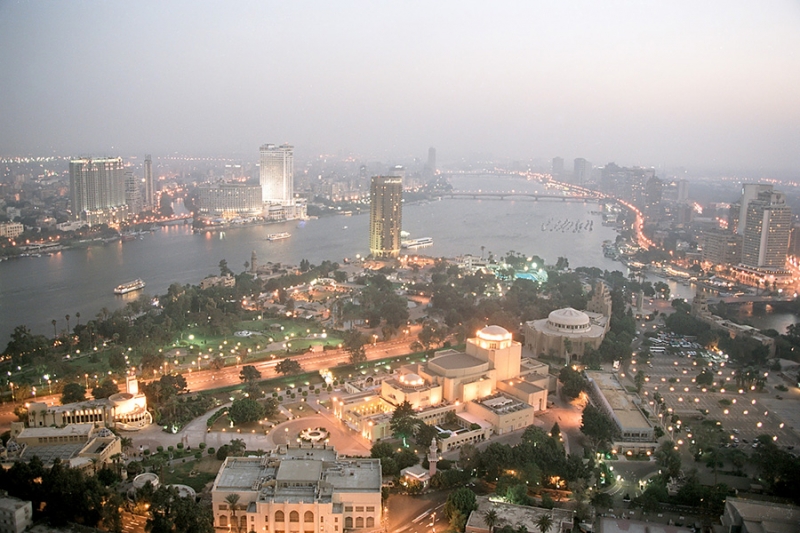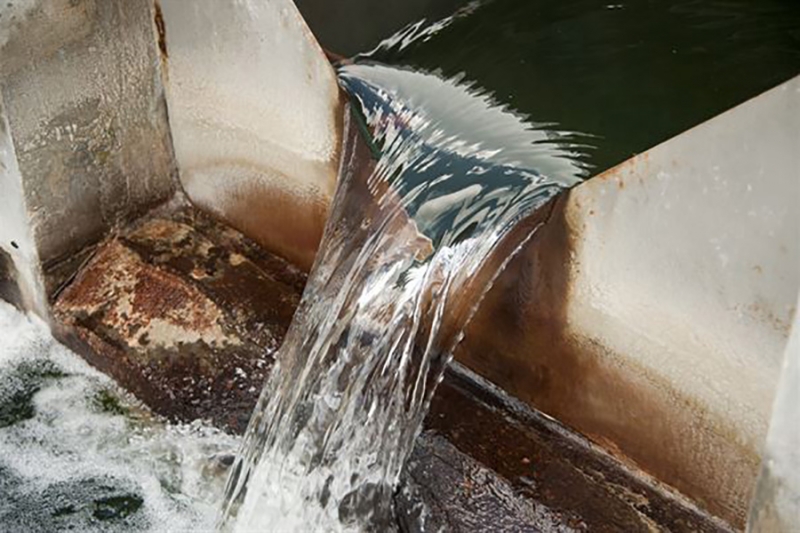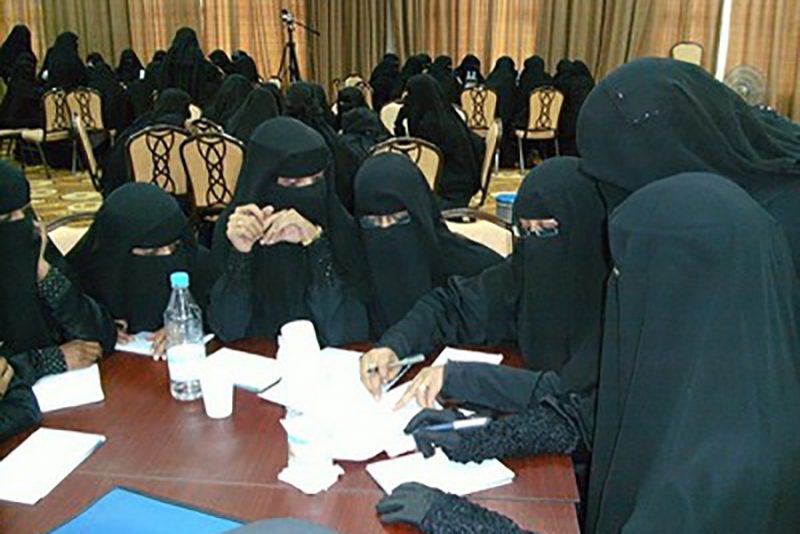ASAN Xidmət (ASAN Service) was established in 2012 as part of the comprehensive reforms on the modernization of public administration and public service delivery initiated by Mr. Ilham Aliyev, President of the Republic of Azerbaijan. ASAN Xidmət centers are “one-stop shop”-based locations that bring together representatives of various government entities and private companies. Services in the centers are rendered based on the “single space” approach.
The acronym of “ASAN” stands for “Azerbaijan Service and Assessment Network”. The word “asan” means “easy” in Azerbaijani. So, when people apply to ASAN centers, they expect to receive services in an easy, transparent, accessible and comfortable way.
ASAN Xidmət ice centers employ “one-stop shop” principle in the most advanced manner, whereby 10 state entities, together with private companies, provide over 250 services. This model embodies the successful example of Public-Private Partnership. ASAN Xidmət is run by the State Agency for Public Service and Social Innovations under the President of the Republic of Azerbaijan.
What makes ASAN Xidmət unique is that while the State Agency manages the “space”, government agencies are directly responsible for rendering their own services. The State Agency is responsible for setting standards and principles and overseeing day-to-day functioning of the ASAN Xidmət centers, whereas governmental agencies are responsible for providing quality service. Thus, there is neither duplication of functions, nor a conflict of interest between a standard-setter and those applying these standards.
Thus, a citizen can benefit from various public and private services in one center (single administrative building) at the same time by entering through one door. ASAN Xidmət operates from 10 am until 8 pm without lunch break, including weekends from 10 am until 5 pm. This enables the citizens to access the services after work hours and on their free time.
ASAN Xidmət ensures transparency, accessibility, efficiency, responsibility and comfort in the process of service delivery and enables the citizens to save time and money. Comfort has been ensured in two ways: one is the physical comfort designed for visitors, such as e-queue system, bank, post office, photo studio, emergency aid, laboratory, kids’ area, mother-care room, Wi-Fi café, self-service area, modern art corner, etc.
ASAN Xidmət centers represent a new approach to ensuring public satisfaction with the functioning of state entities and to enhancing the relationship between civil servants and the public. Nine ASAN Xidmət centers operate in the country and more are planned for opening soon.
In order to ensure the access of the citizens to services in areas that do no host physical service centers an innovative service delivery was launched: Mobile ASAN Xidmət. Well-equipped large buses travel to regions to deliver various services in rural and remote areas. This type of service is unique and ground-breaking in terms of its content and technical solutions both in Azerbaijan and beyond.
These buses enable people residing in the regions, where ASAN Xidmət centers have not been opened yet, to benefit from a range of public services. Also, citizens can order Intracity Mobile Services without leaving their place of work or home any other location, by paying additional fees as set forth in the law. Thus, all documents required for applying to services and those issued as a result of the service can be delivered to a person’s workplace or home, or any other location. In order to promote social cohesion and solidarity Intracity Mobile Services are available free of charge for people with disabilities and in need of assistance, and for children with limited health conditions.
ASAN Service widely applies modern technologies and social innovations to increase efficiency and quality of the service. The objective is not only to ensure the timely delivery of services, but also to identify the best methods of doing so. Applications include electronic queue machines, e-signature technology, video feedback booths, exit-poll monitors, etc.
Through its website, social networks (the official ASAN Facebook page has more than 385,000 “likes”), as well as the recently launched ASAN Radio - the first-ever FM radio station in the world completely dedicated to the public service delivery – ASAN Xidmət engages with the public, disseminates useful information, raises public awareness on new developments and hosts discussions of pertinent issues.
Along with the abovementioned features one of the primary principles is the respect to human rights and dignity through:
- Standardization of its work on the basis of views and opinions of citizens;
- Setting up ethical and high moral treatment of visitors;
- Design of accessible space for interaction with citizens,
- Survey-based indicators of progress and increase of quality.
The following statistical data can serve as the indicators of the level of the public’s accessibility:
- Each of 9 ASAN centers renders services to more than 2500 people daily;
- Around 8.4 million people have accessed ASAN services so far;
- Around 500 thousand persons in 112 destinations have received services through inter-regional mobile ASAN service.
- Launched in March 2014, intra-city mobile service has been rendered to 3500 persons in Baku. 470 of them were received free of charge by persons with disabilities;
- More than 900 thousand calls have been received by 108 Call Center;
- ASAN’s Facebook page enjoys around 385.000 “likes”;
- The ASAN website is visited by 25 thousand persons weekly;
- The public satisfaction rate stands at 98%.
ASAN Xidmət is the first-place winner of the United Nations Public Service Award in the category of “Improving the Delivery of Public Services” as one of the most advanced, transparent, accessible and corruption-free public service delivery mechanisms around the world. The Award is the most prestigious international recognition of excellence in public service that aims to discover new innovations in governance, and collect and share successful practices for possible replication between and within countries.
ASAN Xidmət is also a holder of the international standard on quality management system ISO 9001:2008, the international standard on occupational health and safety management system OHSAS 18001:2007, as well as the International Safety Award by the British Safety Council.
The following successful outcomes can be replicated in other countries:
- Establishment of a modern, transparent, accessible, citizen-oriented corruption-free public service delivery mechanism.
- Coexistence and cooperation of public and private entities.
- Development of professional public service officers based on a strong HR strategy.
- Universal access of all citizens to public services, through physical centers and well-equipped buses.
ASAN Xidmət is ready to share its best practices with other countries in particular as regards its HR policy, training capacity, PR strategy, construction and design of centers, application of advanced technologies, etc.
Budget: There is no clear-cut budget for this solution. Countries wishing to replicate this model may establish one service center that will deliver services of 2-3 public and private entities as a starting point. Budget may vary depending on a country and the number of services to be rendered in the centers.
Contact details:
Azerbaijan, Baku
ASAN Xidmət
Contact person: Mr. Elchin Huseynli
Phone: (+994) 12 444 74 41
E-mail: This email address is being protected from spambots. You need JavaScript enabled to view it.
Web links: www.vxsida.gov.az
Facebook: www.facebook.com/asanxidmat
http://ssda.southsouth.world/component/k2/author/42-webadmin?start=216#sigProId4f5f8d01f7
Solution: “ASAN Məktub” is a project initiatiated and implemented by the volunteers of ASAN Xidmət.
Goals and objectives: The overall purpose of the project is to promote the sense of social responsibility and social solidarity in the public by providing a conduit for responsible, benevolent and compassionate people and organizations willing to help realize wishes of children in orphanages or from low-income families, as well as children with disabilities or health impairments.
The project aims to bring joy to children that fall under the category of vulnerable groups. It also inculcates social responsibility senses under the slogan of “ASAN love toward children”, turns into reality wishes and dreams of children through the www.asanmektub.az website.
Implementation: The concept of the project is as follows. Every child under 14 from all over Azerbaijan can write a letter of wish and ask for a dream gift, which is collected by ASAN volunteers and uploaded to the www.asanmektub.az portal. Then any benevolent person privately or representing an organization may choose any letter or letters and assume commitment to realize the wish/wishes by leaving on the website his/her name and contact details. Afterwards, that person is contacted by a volunteer acting as “ASAN Messenger”, and they agree on a date and time when the gift can be collected.
The gift is then delivered to a child in any part of Azerbaijan by the ASAN Messenger, while a photo proof of the gift delivery is sent to the citizens via e-mail or other communication.
The project does not allow for donation of money and luxury goods, as well as second-hand goods. Gifts must be brand new. Also, the project guarantees the confidentiality of benefactors upon their preference.
Achievements: The project was launched in March 2015 and up until April 2016, more than 680 letters have been received and wishes of more than 570 kids have already been fulfilled.
Replication: Participation in the project is free. Maintaining the portal is done by ASAN volunteers and requires minimum financial resources.
Budget: Participation in the project is totally free of charge. Maintaining the portal is done by ASAN Volunteers and requires minimum financial resources.
Contact details:
Azerbaijan, Baku
ASAN Xidmət
Contact person: Mr. Elchin Huseynli
Phone: (+994) 12 444 74 41
E-mail: This email address is being protected from spambots. You need JavaScript enabled to view it.
Weblink: www.vxsida.gov.az, www.asan.gov.az
http://ssda.southsouth.world/component/k2/author/42-webadmin?start=216#sigProId02324e4e21
The project aims to socially and economically empower disadvantaged youth and women in market oriented technical, entrepreneurial and managerial skills, confidence building and empowering skills necessary to improve their access to productive resources and sustainable earning potential.
The project implements the "3x6" innovative approach to create sustainable livelihoods for Youth based on savings. The youth received a daily income for their engagement in the WASH activities where they are encouraged to save two-thirds of the total earned income. The youth's saved income, and then tripled by UNDP. The total amount then forms the capital for the youth`s business projects.
The project provides trainings linked and integrated with other complementary interventions such as access to markets, appropriate technology, microfinance, entrepreneurship development and follows up technical assistance and advisory services.
The project has adopted a comprehensive, market-driven, gender responsive and community-based strategy. It involves strategic partnerships with local authorities, Local Councils, religious leaders, NGOs, private sector, and relevant institutions, and contributes to strengthening their capacity as responsible service providers, facilitators and advocacy actors.
The project has achieved the following accomplishments:
- Built the capacity of 217 youth (males and females) on marketing skills which developed businesses plans to start up small businesses
- Raised the targeted group awareness on the importance of the savings
- Community participation through cash for work activities
Partners: UNDP and For All Foundation (Yemen)
Contact details:
Yemen (Sanaa - Nouakchott street, behind Plaza Hotel)
Sabah Badri Bakker, Executive Manager
Tel: 00967-733157777
This email address is being protected from spambots. You need JavaScript enabled to view it.
The project promotes women economic empowerment and poverty alleviation by educating rural women on assembly, installation, and maintenance of Solar Photovoltaic (PV) Systems and offering the eco-friendly form of energy use to local communities.
Through the set-up of a rural village training cooperative and a solar workshop run by the village women which produces and carries out maintenance of solar PV systems and providing trainings to other rural women the project contributes to:
- Providing a sustainable source of energy by training rural women on building solar PV systems.
- Enhancing education for school students by offering a sustainable source of illumination.
- Minimizing the country`s carbon footprint by using a renewable energy source.
- Improving the standard of living for rural communities by introducing solar energy systems.
- Encouraging young women and men to develop economic opportunities in rural and remote villages.
The idea of promoting the alternative source of energy through economic empowerment of rural women is based on expertise and experience of the Barefoot College (India), a non-governmental organization that has been providing basic services and solutions to problems in rural communities for more than 40 years, with the objective of making them self-sufficient and sustainable. For the solar electrification of villages, Barefoot College annually trains about 100 grandmothers from India and 80 grandmothers from international rural villages located in the least developed countries. The grandmothers complete a comprehensive 6 month solar engineering training program at Barefoot College campus in India where they learn how to light up solar home units, solar lamps, and charge controllers. Upon completion of training, the grandmothers return to their village to electrify up to 250 households with solar lighting units and assume the responsibility of repair and maintenance for a minimum of 5 years.
Cooperation between the Barefoot College and Friends of the Environment Society (Jordan) and efforts of the project led to achievement of the following outcomes:
- A minimum of 8 women are trained in solar engineering in the rural village to be able to build and assemble a solar photovoltaic system for home use and transfer their knowledge and experience to their communities
- 80 rural homes of local community members have been fitted with Solar PV light systems
- The local cooperative provides a financial sustainable for local women income
- Local funding for the project development is committed for the startup phase of the project
- Reduce of local consumption of conventional electricity in the homes due to replacement with solar systems
- A marketing strategy for products is developed and operationalized
Countries contributed to the implementation of the project offer their support to the developing countries that are in need to find a sustainable solution for poverty eradication, women empowerment and developing renewable energy sources.
Partners:
Barefoot College (India), Friends of the Environment Society (Jordan)
Contact details:
India
Tilonia, Ajmer District, Rajasthan
Meagan Carnahan Fallone, Global Strategy & Development
Barefoot College,
Tel: +1 646 781 4353
Email: This email address is being protected from spambots. You need JavaScript enabled to view it.
Website: www.barefootcollege.org
Jordan
Jordan Friends of Environment Society, Raouf Dabbas, Vice-President
Tel: + 962 79 5524024
Email: This email address is being protected from spambots. You need JavaScript enabled to view it.
Other weblink: www.jofoe.org
Guided by UNDP's Gender Equality Strategy 2008-2013, UNDP Bahrain worked with national agencies and civil society towards the empowerment of women and gender equality in Bahrain. In 2002, UNDP partnered with the Supreme Council for Women (SCW) and Bahrain Institute for Political Development (BIPD) to provide training for women candidates for the 2002 elections. UNDP Bahrain also supported the Supreme Council for Women (SCW) to implement the National Strategy for the Advancement of Bahraini Women through a programme, which was signed in 2009. The UNDP-SCW Women Programme had four major objectives: building institutional capacity for Gender Mainstreaming and Women Empowerment, enhancing economic empowerment of women, enhancing Bahraini women`s political empowerment and finally, ensuring gender mainstreaming in national plans.
Under the Women Programme UNDP supported the establishment of Equal Opportunity Units at government ministries and institutions. Currently, there are more than 20 Equal Opportunity Units (EOUs) in government institutions and private sector with staff dedicated to ensuring gender equality in the organizations they belong to. Capacity building activities were conducted for staff working in government Equal Opportunity Units; full training modules were developed and staff received training over a period of 6 months. Staff of the EOUs were introduced to various concepts; from basic definitions of Gender Mainstreaming and its terminology to the concepts and application of gender sensitive and gender responsive budgeting.
The concept of Gender Sensitive and Gender Responsive Budgeting was also introduced to Parliamentarians under the UNDP project u201cStrengthening Capacity of the Parliamentu201d. A Gender-Responsive Budgeting workshop was organized where concepts and approaches were presented to the MPs. Using CEDAW as one of the frameworks for focus, as well as MDG targets, emphasis was put on equitable distribution of resources among all groups in society highlighting the aim of empowering women for progress in achieving the advancement of sound economic governance.
UNDP has expanded women`s access to productive assets and financial services through the establishment of funds and micro-finance schemes and promoting women`s entrepreneurship. The Micro-Start programme, which has been operating in Bahrain since 1999, and the expanded Micro-finance scheme, aimed to reach more women and youth. Fifty percent of recipients of micro-credit at the local communities` level are poor women.
Partners: Supreme Council for Women (SCW), Parliament of Bahrain, and Bahrain Institute for Political Development (BIPD), Ministry of Social Development
Contact details:
Address: UN House 69, Road 1901,
Hoora 319
PO Box: 26814,
Manama, Kingdom of Bahrain
Ms. Jehan AlMurbati
Phone number: +973 17319416
Email: This email address is being protected from spambots. You need JavaScript enabled to view it.
The Project was initiated in Gayyath Village in Eastern Desert with an aim to offer the eco-friendly form of energy use to local communities by educating rural women on assembly, installation, and maintenance of solar PV systems.
The setup of a Solar energy training cooperative and the establishment of a solar workshop in their village offers job opportunities for the women villagers and provide a means to improve their lives.
The project has trained two women-trainers on solar electrification in Barefoot College in India to enable them to provide trainings to other women in the village and 20 women from the village on building, assembling and maintaining solar PV systems to produce devices using solar energy.
In addition, illiterate and semi-literate women have gained skills in basic management, accounting, warehousing and inventory (stocks) and marketing and sales which enabled them to provide services to the community, have a sustainable income and improve own lives and lives of their families and therefore, contribute to a sustainable development of their community.
Due to the changes brought by empowered women with a use of the modern technology the rural Jordanian Bedouin community has rising out of poverty to the dignified life.
Partners:
Barefoot College (india), UN-Women, the Jordanian Friends of Environment and the Ministry of Environment of Jordan
Contact details:
Jordan
Mr. Basel Burgan - President - Jordanian Friends of Environment
Tel: +962-79-5583038
Email: This email address is being protected from spambots. You need JavaScript enabled to view it.
Other web-links: www.JoFoE.org
The solution was initiated in 2012 to ensure the women's basic right to citizenship during the democratic transition in Egypt by issuing the national identity cards (ID Cards) to poor and marginalized women in the rural areas and consequently, to improve the access to civil, social and economic rights.
The Women Social Initiative leads to:
- Access of women and rural dwellers to the basic right of citizenship
- Increase of women`s political participation
- Promote the gender-sensitive mechanisms of public service delivery
- The raised awareness of women about the right of citizenship and the links between the citizenship and access to the public services.
The Initiative is aimed to issue 2 million National ID cards for those Egyptian women living in marginalized areas through the mobile registrars of the Ministry of State for Administrative Development. The civil registration will enable women to cast a ballot in the voting polls and seek membership in political parties and access the public services such as medical care in the public health facilities, literacy programs, employment opportunities, registration of property rights, banking services and loan programs.
Since 2012, over 230,000 women and rural dwellers across 12 Egyptian governorates have been registered by the mobile registrar units to have the right to be a citizen and to be eligible to vote. Women in the Greater Cairo and the Upper Egypt are more aware of their citizenship`s rights due to a fully-fledged TV and Radio campaign that included five Public Service Announcements aired at the prime time hours on the State TV with a reach out to more than 2 million viewers.
The campaign made the significant contribution to awareness raising among targeted women about the benefits of holding the ID Card, and urged women to claim the ID Cards in the process of the mobile civil registration in villages. The Women Citizenship Initiative serves as a model for promoting gender responsive delivery of public services through its technical support for the Government to send mobile registrar units and establish mapping and coordination mechanisms in the MSAD which focus on delivery of the public services to women.
Partners:
The Citizenship Initiative project has been developed by UN Women in partnership with UNDP, the Ministry of State for Administrative Development (MSAD), the Ministry of Foreign Affairs (MOFA), the Civil Status Organization (CSO) and the Social Fund for Development (SFD). The Citizenship Initiative also involves the National Council for Women (NCW) and several NGOs, including the Red Crescent of Egypt, and the Association of Girls Guides and Girls Scouts
Contact details:
The Ministry of State for Administrative Development of Egypt
Mr. Tarkek Saad
Email: This email address is being protected from spambots. You need JavaScript enabled to view it.
The mechanism is aimed to promote youth and women employment by upgrading informal apprenticeship (IA), creating knowledge and developing practical skills of young women and men through on-the-job apprenticeships.
The mechanism is based on strong cooperation with business associations, NGOs and communities that enable to mobilize businesses, and covers the following issues:
- Quality of Training: Enhance access to new skills and technology for mentors, provide new skills for apprentices, monitor and assure training quality and content
- Financing: Ensure that incentives are in place that businesses and apprentices participate
- Decent Work and Quality: Abolish child labor in informal apprenticeship, improve working conditions and health and safety at work (building on the ILO WISE (Work improvement in small enterprises) methodology), improve social protection and strengthen gender equality
- Linkages between IA and formal systems: Promote contracts, promote recognition of skills in formal labor markets, and support formalization of unregistered businesses.
In Egypt, implementation of the ILO/WFP/UNICEF Child Labour Project in 2008-2011 led to formalization of working relations through apprenticeship contract (tadarrug elmeheni), regular monitoring, occupational safety and health (OSH) improvements for 1000 apprentices in 72 occupations including: glassware, soap production, barber, baker, turner, wood painter, plumber, tailor. Since 2011 the apprenticeship component has targeted 3000 apprentices in 25 agriculture-related trades with apprenticeship contracts, skills scorecard for each occupation (to track on-the-job learning progress), off-the job training to apprentices (one day per week during 4 months), master craftspersons trained and OSH improvements.
In Tunisia, work has resulted in development of recommendations on improving governance and reviewing the regulatory frame for apprenticeship, strengthening the role of the apprenticeship counselor inside training centres, and the workplace trainers (maitre d`apprentissage), opening pathways from apprenticeship to further learning. A virtual platform is being created under a Spanish funded Youth Employment project to share good practices, tools and material and enable practitioners to exchange and discuss and strengthen the socio-professional network among apprenticeship counselors and workplace trainers.
In Jordan, youth received 6 months training in a private training centre (organized through IYF, including OSH, life skills, IT, rights at work, career guidance) and 4 months on-the-job training in micro and small enterprises.
Apprentices received accident insurance and participated in a competition for the best apprentice, training quality was improved through on-the-job skills tracking, training of workplace trainers, an award was given to the best employer, OSH improvements at the workplace were realized through WISE, and over 85% of participating apprentices have passed skills assessments to obtain a work license.
Partners: Ministries of Labour and Manpower in respective countries, training authorities and agencies like ATFP (Tunisia), ETVET Council and CAQA (Jordan), training institutions under the Ministries, NGOs including IYF (Jordan), CEOSS, Ali Mubarak, Caritas, Terre des Hommes (Egypt), employer associations, trade unions.
Contact details:
ILO Decent Work Team Cairo
ILO Decent Work Team Beirut
Geographic Focus: Global
Thematic focus areas supported by the mechanism:
MDG 8 on Global Partnerships for Development; Saudi Arabia has emerged as one of the largest Southern providers of ODA, providing over $23-bill/yr overall ODA for humanitarian and development objectives. This includes important support to UN efforts around the world. As a result strong levels of interaction exists between various UN agencies and local partners within the Kingdom, but with a need for greater coordination among UN agencies, enhanced knowledge sharing on UN facilitated south-south cooperation initiatives with the Kingdom, and efforts to improve common UN positioning, reporting and advocacy. As a result, a new UN Theme Group on South-South Cooperation has emerged with membership of UNDP, UNICEF, UNHCR, FAO and WHO. It focuses on analysing for the past and future role of Saudi Arabia as a global partner in development, convening roundtables with partners to discuss emerging challenges, needs and scope for greater UN facilitation roles, and raising visibility of the role of the Kingdom as a global partner, including for UN initiatives.
Steps/Stages in the practical application of the mechanism:
The mechanism arose from the lead role of UNDP in designing a specific Outcome on South-South Cooperation in the new UN Common Country Strategic Framework for Saudi Arabia (CCSF; 2012- 16) and convening a core group of UN agencies within the UN Country Team engaged in managing Saudi contributions to UN agency initiatives globally, such as UNICEF, UNHCR, FAO and WHO. Through rounds of discussions among UNCT members, agreement was reached that more coordinated efforts would be of common value and of potential benefit to Saudi partners as well to have a common voice and common channel for communication. The UNTG launch has been led by engagement of a South-South Cooperation Advisor to kick start initial activities including production in 2013 of a UNCT report on "Saudi Arabia and the UN: A Global Partnership for Development" to have common understanding among UNCT members and between UNCT and Saudi partners on the full extent of the Kingdom`s large scale ODA programme and cases of support to UN initiatives.
Results to Date:
A draft of the new UNCT report on "Saudi Arabia and the UN: A Global Partnership for Development" has been produced and a SSC Roundtable is planned for 2013 to discuss the report with key Saudi partners and chart the course for future SSC.
Most Recent Annual Budget (USD): 25,000
Total Budget (USD): 50,000
Focal Point and Contact:
Ibrahim El Ziq
UNICEF Gulf Area Office Representative Chair, UN Theme Group on South-South Cooperation, Saudi Arabia
UN Premises, Diplomatic Quarter, Riyadh 11614, Saudi Arabia
Tel: +966-1-4885301
Email: This email address is being protected from spambots. You need JavaScript enabled to view it.
Geographic Focus: Sudan
Development challenge and key achievements:
Poor road infrastructure is a key problem hindering development in Sudan. It challenges both internal and external trade, as well as implementation of development projects. Therefore, the Governments of Egypt and Sudan agreed to jointly construct a 280 km- Road (linking Suez Coastal Road, Egyptian borders and Port Sudan); whereas construction and fund are divided equally among the two countries.
In February 2009, the Government of Egypt completed its part: the construction of 140 km. While The Government of Sudan has finished 70 km so far and is currently preparing the fund required for the completion of the project.
The comparative advantage of the solution:
- This Road will facilitate trade between Egypt and Sudan, as well as the implementation of more development projects; which will contribute to poverty reduction- one of the main national development priorities in Sudan;
- The success of this project is due also to clear political commitments at senior levels in both countries and the establishment of specific objectives, identifying the role of each side.
- The experience gained through this cooperation would strengthen understanding of the potential gains of SSC with other African and Arab countries that lack the necessary or adequate expertise to handle similar concerns
Lessons Learned:
- Lag in the implementation process can be avoided through continuous communication and follow-up among the involved stakeholders to resolve any risen challenges or difficulties.
- Engaging banks in SSC through providing long-term loans can resolve the problem of funding constraints.
- Southern countries should develop systems and practices that would facilitate SSC.
Recent Annual Budget: 270 Million EGP
Focal Point and Contact:
Ghadeer Hegazy, MOIC - Egypt
8 Adly Street, Downtown,
Cairo, Egypt
Email: This email address is being protected from spambots. You need JavaScript enabled to view it.
Background:
Water scarcity has become a global problem with the increasing number of urban population and civil progress and the increase of agricultural area, in addition to the overlap with the industry and human consumption and the form of the growing demand for water which consider an additional factor in the scarcity of water. One of the solutions that have been developed to solve this problem is desalination of sea water but this process is very expensive because of the need for advanced transactions. Another priority task processor is to use triple-treated wastewater which can be considered synonymous with another agricultural uses.
Current situation analysis:
In Oman there are nearly 44 sewages belong to the Ministry of Regional Municipalities and Water resources, they are distributed in different governorates of the Sultanate. Treatment plant produces more than 33,000 cubic meters per day. There is also about 11 sewages treatment plant in the governorate of Muscat with a daily output of more than 80,000 cubic meters and it is expected to reach the amount of sewage produced about 270 000 cubic meters per day, equivalent to 100 million cubic meters annually by 2030. Approximately 60,000 gallons per day are used for the irrigation of parks and green spaces and trees, as it is expected to increase these quantities, especially after the drainage of the city of Muscat project is complete.
Many Arab and international studies on the treated sewage water uses was conducted, and found that it is important to use treated wastewater in agriculture after developing the techniques of treatment. A study conducted in Kazakhstan in collaboration with ICARDA, showed that the treated water has been used successfully in the irrigation of crops (sorghum, Sudan grass, sorghum). The preliminary data of the soil assured that there was no mention of salinity or combine heavy metal accumulation. The United States Environmental Protection Agency (USEPA) Confirmed in 1981 that heavy metals have no adverse effect on crop growth.
Project Studies:
The Ministry of Agriculture and Fisheries, represented by the Directorate General of Agricultural and Animal Research conducted research and studies on various agricultural crops, especially forage crops using triple-treated wastewater starting in 2004, where it was the implementation of a range of quality testing for the use of water triple therapy Lori agricultural crops such as maize , sorghum, barley, wheat and then agricultural soil and irrigation water treatment analysis for a triple degree of acidity (pH) and electrical conductivity (EC), as well as major, minor elements and heavy elements to determine the percentage of residues (if any).
Research results in 2004-2008 confirmed the success of the cultivation of these crops using treated wastewater triple and without any residue in the plant or the soil.
A research/ development project was implemented for 2 years (2008-2010) next to the treatment plant in Saham - belongs to Ministry of Regional Municipalities and Water Resources and with funding from the Oman Liquefied Natural Gas (LNG) and using three forage crops (barley Hordeum vulgare L. high and corn Sorghum bicolor L and maize Zea mays L.).
Project Objective:
Take advantage of the triple-treated wastewater from sewage plants in the governorates to use in in cultivation and production of seasonal fodder. In order to plan for the future to make use of treated wastewater in agriculture and the production of fodder seasonal, the project has been established and evaluated according to technical-economic standards.
The Process:
The cultivation of the first loop of the barley crop (Barley) during the period until 8/11/2008 and 10/3/2009, productivity has reached to 125 tons of green fodder for an area of 6 acres, and the water consumption rate is about 10 259 cubic meters to irrigate the crop length of Agriculture.
- The cultivation of sorghum (Sorghum) of the two categories (Super dan, Sweet Jumbo) during the period 15/4/2009 until 22/6/2009, production reached 193 tons of green fodder for an area of 6 acres, while the water consumption rate estimated at 30 923 cubic meters to irrigate the crop length of Agriculture.
- The cultivation of maize crop (Maize) cultivars (Hyb533, Hyb756IT) during the period from 19/8/2009 to 29/10/2009, reaching production of 154 tons of green fodder for an area of 6 acres, and as the water consumption of the crop for the duration of agriculture about 24 479 cubic meters .
- The cultivation of the second loop of the barley crop during the period 19/11/2009 until 02/18/2010, where green fodder production in the winter season was 2009/2010 of 96 tons and was water consumption rate of 26 448 cubic meters.
- The cultivation of the second loop of the crop sorghum (Sorghum) during the period 19/04/2010 till 06/13/2010, where production reached 235 tons of green fodder, as far as water consumption rate of about 24 055 cubic meters.
- The cultivation of the second loop of the crop corn (Maize) in an area of 2.7 acres where they were leaving the remaining area of 3.3 acres second of the sorghum crop of condensed has been harvesting on 09/29/2010 m The total production of green fodder amounted to about 148 tons total area (6 acres ) of green forage crops of maize and high. The total water consumption rate of 43025 cubic meters.
Results:
The economic-socio feasibility study of the three lugs of barley crops , sorghum and maize, proved that there is a feasibility and investment opportunities for the expansion of such projects using sewage triple therapy, where the project data indicated that the profitability of the income return (IRR) after two years after planting was 36 % that is considered a high rate when compared to the average accepted
It is worth mentioning that the project has won the first place in Amman Prize for the Environment 2011 for the Green Environment Research category.
Owner:
Ministry of Agriculture and Fisheries - Directorate General of Agricultural and Animal Research
Contacts:
Eng. Saif bin Ali bin Salim Khamisi
Head of Laboratory Field Crops Research
Directorate General of Agricultural and Animal Research
E-mail: This email address is being protected from spambots. You need JavaScript enabled to view it.
Tel. 00968 24504030
Fax: 00968 24504088
E-mail: This email address is being protected from spambots. You need JavaScript enabled to view it.
The Balqees Initiative (TBI) is a leadership development and community-level awareness-raising program targeting women and youth from Mareb implemented by the Partners for Democratic Change in Yemen (former Partners-Yemen) in 2010. The overall goal of TBI is to establish a network of women`s leaders possessing the capacity, resources, and skills necessary to raise local level awareness around key development topics. In order to build such a network, TBI trains influential females in rural Yemen in leadership, facilitation, and conflict management skills, as well as critical development topics such as health, youth empowerment, education, and entrepreneurship. As an end state, TBI will establish a network of key development actors with the capacity, resources, and skills necessary to deliver messages and ideas, which reinforce positive values and enforce stability in Yemeni society.
Initial 25 women leaders were recruited and trained in community engagement and basic health, education, and economic development best practices. These women were then responsible for training an additional 240 women from their local communities, who hosted 4,000 community outreach events throughout Mareb on relevant education, health, and economic development topics reaching over 30,000 women and youth.
The TBI team was able to turn the presence of male escorts (muhrams) at the trainings for women, from a challenge into an asset by providing separate training sessions for the men, transforming potentially suspicious male relatives into advocates for women's role in development
Within the first year of implementation the solution has achieved the followings:
- Women involved as primary and secondary leaders seeing themselves as stakeholders and drivers of development and community level change.
- Men (escorts) incorporated into the program, resulting in their willingness to support their female relative in the program and tell other men about what they have learned in the program.
- Increase knowledge of primary leaders: The 50 Social Facilitators showed an average improvement of 41% between pre- and post-test scores on the subjects of leadership, facilitation, conflict management, education & youth empowerment, entrepreneurship, and health.
- Overall health benefits: following the program saw an increase in vaccinations in certain communities.
The project was extended into the Shabwa region with the aim to reach an additional 30,000 women and youth through local women leaders.
Partners: US Embassy in Yemen, Ministry of Local Administration (MOLA), governor of Mareb
Contact details:
Partners Global
Together for Democratic Change
Jonathan Apikian, Deputy Director, Middle East & North Africa
Address: PO Box 16302
Sanaa, Yemen
Phone number: +1 202 469 3662
Email: This email address is being protected from spambots. You need JavaScript enabled to view it.








